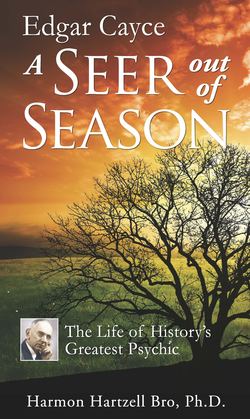Читать книгу Edgar Cayce A Seer Out of Season - Harmon Hartzell Bro - Страница 29
На сайте Литреса книга снята с продажи.
Love As Quenched Wrath
ОглавлениеThe Cayces spoke of his readings as an active agent, which they called “the information,” though it provided as much judgment as data, as much values as facts. They appeared to do this in humility, not wanting to claim overmuch for the presence in their midst. It was indeed a presence for them, almost another character in the drama of their lives, and often the protagonist. Dependable yet never fully predictable, compassionate yet never indulgent, and lawful yet not to be manipulated for private gain—it was familiar, but it was always awesome. For it showed flashes of such purity, goodness, and staggering helpfulness as to leave all of us uncertain of our worthiness to be there. Its spirit many times recalled for me Rudolf Otto’s description of the holy as numinous, partaking of a mysterium tremendum et fascinosum,17 and his observation that God’s love was only his quenched wrath.
Some of our sense of humility and awe, of course, came from the awareness that “the information” would be accurate on items we could verify. We had the sense of staring over Cayce’s shoulder into an abyss of final reality, where being and non-being were divided and apportioned. If he said someone would soon die, then we could expect it to happen. If he promised that careful treatment would produce relief or even a cure for a seemingly hopeless condition, then odds were that the treatment would work, if it were fully carried out. If he rebuked someone for a corrosive temper that spoiled a marriage, then that temper would prove to be the problem, although it had never been mentioned in the correspondence. If he ascribed to a youth a talent as a pianist which could stand out in his generation, then that talent would prove to be there, though the youth might choose not to cultivate it far. If (on rare occasions) he counseled someone in such detail as to specify that the best companion to marry would appear in a certain year, then such a person could be expected to show up, with the qualities he described. And if he commented, as he did, that the war would end suddenly and by unexpected means in the Orient, we had reason to think it would, though none of us knew at the time what was being prepared in the Manhattan Project.
Were we brainwashed, hearing more accuracy than was actually there? On one of the first days I went into the study for readings, he advised a twenty-year-old Army Air Corps cadet in Texas to use an Elliott machine every other day for three to four weeks as part of the treatment for a debilitating catarrh. When Gertrude Cayce asked where the young man could have access to one, her husband responded instantly that there were three near to him in San Antonio. I set out to verify this small item and discovered that in fact there were three, and only three, of the colonic irrigation machines in that area, since the prescribed model was newly available. One was in a civilian hospital and two at military bases; none of the institutions knew of the other locations’ use. This was impossible. This was unthinkable. My professors at Chicago would deny it, and who could blame them? Centuries of Western science and philosophy would back up their denials, as well as their own manifest experience. But Cayce was doing it anyway.
Here he was in a deep trance, stretched out on his back. He had the deliberate breathing and some of the restrained movements of subjects hypnotized to a deep level. Yet his speech and thought patterns were far from jerky or mechanical muttering. He was not less but more alert than in his waking consciousness, as his readings pointed out. Indeed, he seemed to have his whole psyche concentrated for action, not dissociated for mumbling response to a conductor. This hypnosis, as a small dying into larger consciousness, was different from classroom exhibitions.
His eyelids fluttered over unseeing eyes until covered. He spoke in phrases paced by his breathing, using a formal and sometimes elevated but not pretentious mode of discourse. Evidently he was working hard, for his expression mirrored concentration, and his lips were lightly pursed. Yet he spoke in firm composure, as though quite sure of what he said. His voice was clearly his own, but with little notes of stateliness that heightened its dignity, and with a resonance that gave it authority while not sounding preachy or oracular.
The manner in which he addressed those who sought his aid added gravity to the encounter. He spoke to or about each one only by name, never using a title, no matter what degrees or positions distinguished the inquirer in daily life. There was a Quaker-like simplicity in this usage. He flattered none and he belittled none, though he challenged many. He did not exaggerate, though he used irony and wit. Such unaffected discourse was at first unsettling to hear and then reassuring, as he seemed to plant himself before the absent person called to his attention with a forthrightness which invited more than it accosted. His speech was not sententious or pompous, just serious. In later years, when I sought out mediums and studied them in trances, I would find their speech dramatic or chatty, as the case might be, but rarely so unadorned and direct as here.
